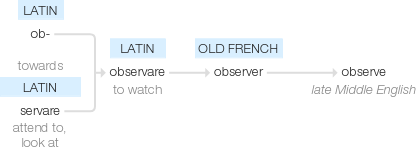Observe
late Middle English (in observe (sense 3)): from Old French observer, from Latin observare ‘to watch’, from ob- ‘towards’ + servare ‘attend to, look at’.
wiktionary
From Middle French observer, from Old French[Term?], from Latin observare(“to watch, note, mark, heed, guard, keep, pay attention to, regard, comply with, etc.”), from ob(“before”) + servare(“to keep”), from Proto-Indo-European *serw-(“to guard”). Cognate with Gothic 𐍃𐌰𐍂𐍅𐌰( sarwa, “weapons, armour”), Old English searu(“device, design, contrivance, art, cunning, craft, artifice, wile, deceit, stratagem, ambush, treachery, plot, trick, snare, ambuscade, cleverness, machine, engine, fabric, armor, equipment, arms”).
etymonline
observe (v.)
late 14c., observen, "to hold to (a manner of life or course of conduct), carry out the dictates of, attend to in practice, to keep, follow," from Old French observer, osserver "to observe, watch over, follow" (10c.), from Latin observare "watch over, note, heed, look to, attend to, guard, regard, comply with," from ob "in front of, before" (see ob-) + servare "to watch, keep safe," from PIE root *ser- (1) "to protect." Sense of "watch, perceive, notice" is from 1560s, via the notion of "see and note omens." Meaning "to say by way of remark" is from c. 1600. Related: Observed; observing.
